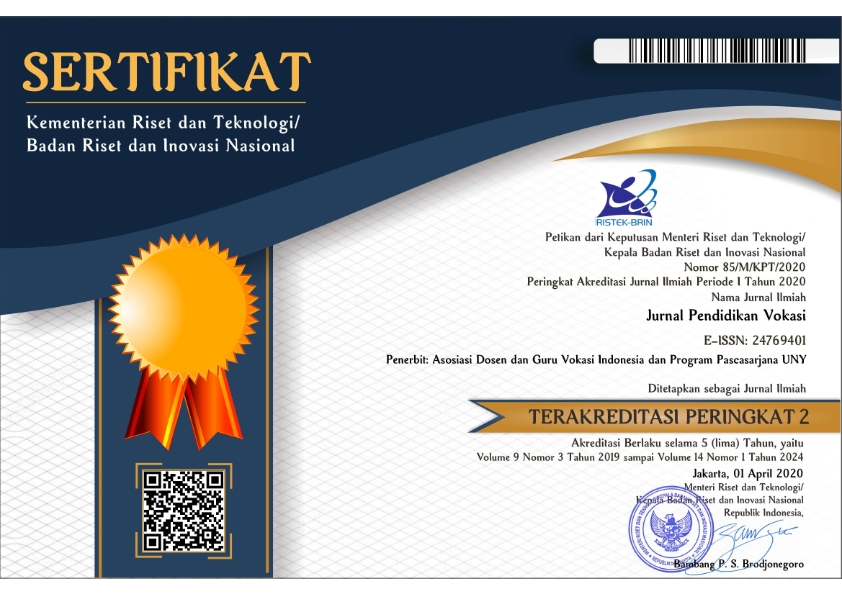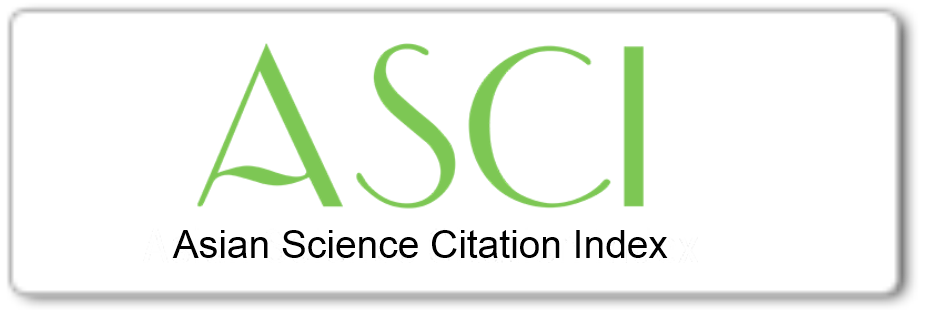The appraisal model of remedial and enrichment activities integrated with the independent curriculum in vocational field
Muhammad Yusro, Universitas Negeri Jakarta, Indonesia
Asnul Dahar Minghat, Universiti Teknologi Malaysia, Malaysia
Cucu Sutianah, Universitas Pendidikan Indonesia, Indonesia
Bayu Rahmat Setiadi, Universitas Negeri Yogyakarta, Indonesia
Fitri Nur Mahmudah, Universitas Ahmad Dahlan, Indonesia
Abstract
Implementing remedial and enrichment strategies followed by modeling the weight of the appraisal is the goal to be achieved in this study. The ASSURE model in this study has been used to develop an appraisal model for remedial and enrichment activities integrated with the independent curriculum in the vocational field. The results showed that the peer tutoring strategy among students could optimize remedial and enrichment outcomes. The students have shown their ability in independent and collaborative learning. In remedial and enrichment activities, groups of enrichment students have been directed to help their friends to be successful in remedial. Students' success in the remedial process is the success of enriching other students and vice versa. Each student has received an appreciation of the value according to his effort. The progress of remedial students is 8% to 82%, with an average of 10%. This progress forms the basis for determining the final score for the remedial, intermediate, and enrichment groups as tutors. The difference between the remedial and enrichment appraisal weights was determined using mathematical model 1. The final score of students who become tutors is determined using the mathematical model 3. The three mathematical models above can calculate remedial, enrichment, and tutor results. The use of this model helps teachers or lecturers to be more objective in giving grades. Lecturers' appraisal of student learning outcomes has been carried out in a transparent, fair, and accountable following the differences in the potential competencies of each student. Students have followed the learning process, the assessment process has been carried out properly, the teacher's documentation is complete, and the teacher is more confident.
Keywords
Full Text:
PDFReferences
Abdelaziz, H. A. (2014). Immersive Learning Design (ILD): A new model to assure the quality of learning through flipped classrooms. 2014 IIAI 3rd International Conference on Advanced Applied Informatics, Ild, 291–296. https://doi.org/10.1109/IIAI-AAI.2014.67
Afriana, J., Permanasari, A., & Fitriani, A. (2016). Project based learning integrated to STEM to enhance elementary school’s students scientific literact. Jurnal Pendidikan IPA Indonesia, 5(2), 261–267. https://journal.unnes.ac.id/nju/index.php/jpii/article/view/5493
Agustina, H., Syahrial, S., Susilawati, S., & Gunada, I. W. (2022). Pengaruh penggunaan modul fisika berbasis problem based learning terhadap kemampuan berpikir kritis peserta didik. Jurnal Ilmiah Profesi Pendidikan, 7(3), 1208–1218. https://doi.org/10.29303/jipp.v7i3.742
Al-Shabibi, T. S., & Al-Ayasra, M. A.-K. (2019). Effectiveness of the flipped classroom strategy in learning outcomes (bibliometric study). International Journal of Learning, Teaching and Educational Research, 18(3), 96–127. https://doi.org/10.26803/ijlter.18.3.6
Ali, S., & Khaeruddin, K. (2012). Evaluasi pembelajaran. Badan Penerbit UNM. http://eprints.unm.ac.id/8554/1/1. Buku Evaluasi.pdf
Ariefiani, Z., Kustono, D., & Pathmantara, S. (2016). Module development with project-based learning approach and assure development model. AIP Conference Proceedings, 1778(July 2009), 030036. https://doi.org/10.1063/1.4965770
Bauman, K., & Tuzhilin, A. (2018). Recommending remedial learning materials to the students by filling their knowledge gaps. MIS Quarterly, 42(1), 313–332. https://pages.stern.nyu.edu/~kbauman/research/papers/2016_KBauman_EdRecSys.pdf
Bonate, P. L. (2000). Analysis of Pretest-Posttest Designs. In Analysis of Pretest-Posttest Designs. https://doi.org/10.1201/9781420035926
Budianto, L. (2011). Integrating independent learning with the curriculum. LiNGUA: Jurnal Ilmu Bahasa Dan Sastra, 2(2), 87–99. https://doi.org/10.18860/ling.v2i2.568
Budiono, A. N., & Hatip, M. (2023). Asesmen pembelajaran pada Kurikulum Merdeka. Jurnal Axioma : Jurnal Matematika Dan Pembelajaran, 8(1), 109–123. https://doi.org/10.56013/axi.v8i1.2044
Burgstahler, S. E., & Cory, R. C. (2010). Universal design in higher education: From principles to practice. Harvard Education Press.
Condliffe, B., Quint, J., Visher, M. G., Bangser, M. R., Drohojowska, S., Saco, L., & Nelson, E. (2017). Project-based learning: A literature review. MDRC. https://eric.ed.gov/?id=ED578933
Cope, B., & Kalantzis, M. (2016). E-learning ecologies. Routledge. https://doi.org/10.4324/9781315639215
Dhelilik, D. (2018). Cara memberi nilai hasil remedial. Bertema.Com. https://bertema.com/cara-memberi-nilai-hasil-remedial
Direktorat Jendral Perguruan Tinggi Kementerian Pendidikan dan Kebudayaan Republik Indonesia. (2020). Buku panduan medeka belajar kampus merdeka. Direktorat Jendral Perguruan Tinggi Kementerian Pendidikan dan Kebudayaan Republik Indonesia. http://dikti.kemdikbud.go.id/wp-content/uploads/2020/04/Buku-Panduan-Merdeka-Belajar-Kampus-Merdeka-2020
Forbes, C. T. (2013). Curriculum-dependent and curriculum-independent factors in preservice elementary teachers’ adaptation of science curriculum materials for inquiry-based science. Journal of Science Teacher Education, 24(1), 179–197. https://doi.org/10.1007/s10972-011-9245-0
Goode, P. (2017). Cannulating a dialysis vascular access: using the ASSURE model. Journal of Kidney Care, 2(4), 212–215. https://doi.org/10.12968/jokc.2017.2.4.212
Goodman, J., & Weare, J. (2010). Ensemble samplers with affine invariance. Communications in Applied Mathematics and Computational Science, 5(1), 65–80. https://doi.org/10.2140/camcos.2010.5.65
Haniya, S., & Roberts-Lieb, S. (2017). Differentiated learning: Diversity dimensions of e-learning. In e-Learning Ecologies (p. 24). Routledge.
Idris, S. H., Muqowim, M., & Fauzi, M. (2023). Kurikulum Merdeka perspektif pemikiran pendidikan Ki Hajar Dewantara. Jurnal Literasiologi, 9(2), 88–98. https://doi.org/10.47783/literasiologi.v9i2.472
Kao, Y.-T., Lin, Y.-S., & Chu, C.-P. (2012). A Multi-factor fuzzy inference and concept map approach for developing diagnostic and adaptive remedial learning systems. Procedia - Social and Behavioral Sciences, 64, 65–74. https://doi.org/10.1016/j.sbspro.2012.11.009
Karyanto, U. B. (2022). Strategi pembelajaran remedial dan implementasinya dalam pembelajaran. Jurnal Ilmiah Sinar Manajemen, 9(1), 63–75. https://e-journal.uingusdur.ac.id/index.php/forumtarbiyah/article/view/25
Kementerian Pendidikan Kebudayaan Riset dan Teknologi Republik Indonesia. (2022). Peraturan Menteri Pendidikan, Kebudayaan, Riset, dan Teknologi tentang Standar Penilaian Pendidikan pada Pendidikan Anak Usia Dini, Jenjang Pendidikan Dasar, dan Jenjang Pendidikan Menengah. Kementerian Pendidikan, Kebudayaan, Riset, dan Teknologi. https://peraturan.bpk.go.id/Home/Download/219038/Salinan_Permendikbudristek No_21 Tahun 2022_ Standar Penilaian Pendidikan.pdf
Mahlianurrahman, M., & Aprilia, R. (2022). Menyusun cerita praktik baik pembelajaran berbasis Kurikulum Merdeka di sekolah dasar. Jurnal Anugerah, 4(1), 43–49. https://doi.org/10.31629/anugerah.v4i1.4283
Minsih, M., Fuadi, D., & Rohmah, N. D. (2023). Character education through an independent curriculum. AL-ISHLAH: Jurnal Pendidikan, 15(1), 597–602. https://doi.org/10.35445/alishlah.v15i1.2812
Noor, A. F., & Wangid, M. N. (2019). Interaksi energetik guru dan siswa pada pembelajaran abad 21. Anterior Jurnal, 18(2), 107–112. https://doi.org/10.33084/anterior.v18i2.456
Noviati, W. (2022). Penerapan model pembelajaran Problem Based Learning (PBL) dalam meningkatkan hasil belajar IPA di SD. Jurnal Kependidikan, 7(2), 19–27. http://www.e-journallppmunsa.ac.id/index.php/kependidikan/article/view/1097
Oktaviani, A. M., Marini, A., & Zulela, Z. (2023). Pengaruh penerapan Kurikulum Merdeka tehadap hasil belajar IPS ditinjau dari perbandingan Kurikulum 2013. Jurnal Educatio FKIP UNMA, 9(1), 341–346. https://doi.org/10.31949/educatio.v9i1.4590
Phillips, L. R. (1967). IV · Students and tutors. Learning for Living, 7(1), 17–17. https://doi.org/10.1080/00239706708555786
Pratycia, A., Dharma Putra, A., Salsabila, A. G. M., Adha, F. I., & Fuadin, A. (2023). Analisis perbedaan Kurikulum 2013 dengan Kurikulum Merdeka. Jurnal Pendidikan Sains Dan Komputer, 3(1), 58–64. https://doi.org/10.47709/jpsk.v3i01.1974
Pribadi, B. A. (2011). Model ASSURE untuk Mendesain Pembelajaran Sukses. Dian Rakyat.
Schmidt, S., Zlatkin-Troitschanskaia, O., & Fox, J.-P. (2016). Pretest-posttest-posttest multilevel IRT modeling of competence growth of students in higher education in Germany. Journal of Educational Measurement, 53(3), 332–351. https://doi.org/10.1111/jedm.12115
Villiger, C., Hauri, S., Tettenborn, A., Hartmann, E., Näpflin, C., Hugener, I., & Niggli, A. (2019). Effectiveness of an extracurricular program for struggling readers: A comparative study with parent tutors and volunteer tutors. Learning and Instruction, 60(November 2018), 54–65. https://doi.org/10.1016/j.learninstruc.2018.11.004
Yogi Anggraena, Felicia, N., Ginanto, D. E., Pratiwi, I., Utama, B., Alhapip, L., & Widiaswati, D. (2021). Kurikulum untuk pemulihan pembelajaran. Pusat Kurikulum dan Pembelajaran Badan Standar, Kurikulum, dan Asesmen Pendidikan Kementerian Pendidikan, Kebudayaan, Riset, dan Teknologi. https://kurikulum.kemdikbud.go.id/wp-content/unduhan/Kajian_Pemulihan.pdf
DOI: https://doi.org/10.21831/jpv.v13i2.61860
Refbacks
- There are currently no refbacks.

This work is licensed under a Creative Commons Attribution-ShareAlike 4.0 International License.
Our journal indexed by:





















